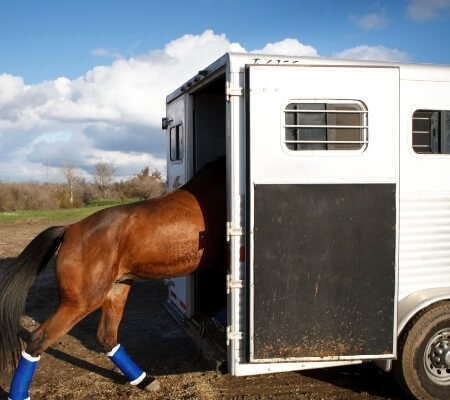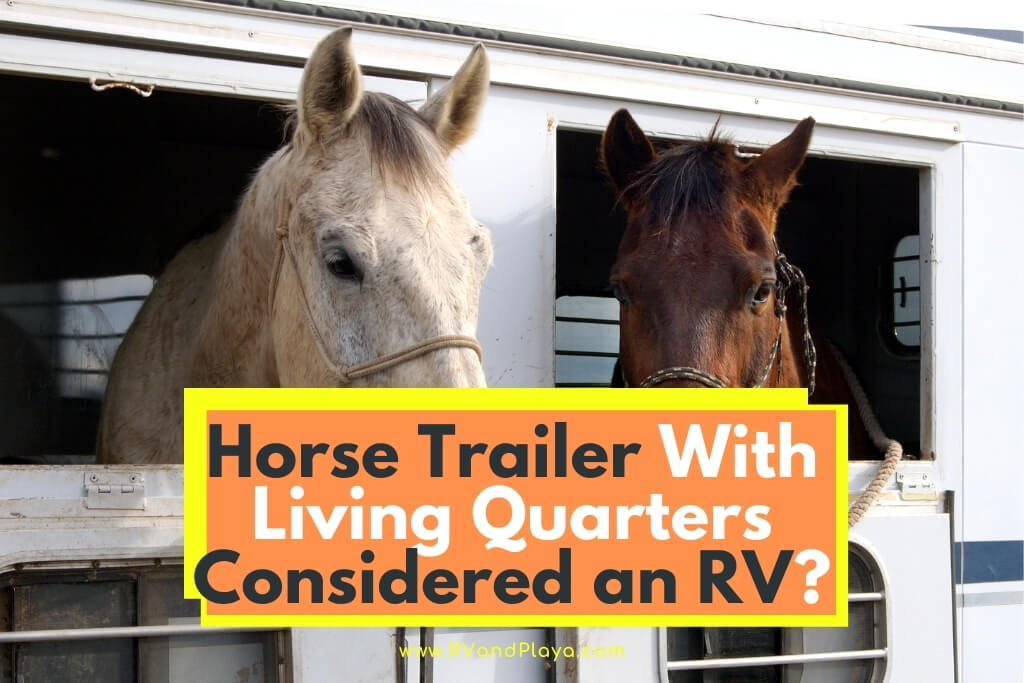People who enjoy traveling or need to travel with their horses might consider a horse trailer with living quarters. There can be a lot of confusion when it comes to registering this type of vehicle, though.
Some areas might pass this type of transportation vehicle like an RV, while others won’t. Knowing the truth will help to save you time, money, and frustration.
Is a horse trailer with living quarters considered an RV? Yes, a horse trailer with living quarters is considered an RV when the living quarters contain a bed, stove, bathroom, and sink. Without these amenities, it would be considered a trailer.
The benefits of registering as an RV means include not needing to stop at weigh stations and paying lower registration fees.
If you are unsure as to whether or not a horse trailer with living quarters can be considered as an RV, this article will be of help.
We are going to break down why a state may (or may not) consider this type of transportation vehicle as an RV.
We will also be sharing some must-know facts and information on how a horse trailer with LQ is different from a regular RV.
Table of Contents
Is a Horse Trailer With Living Quarters Considered an RV?
The biggest thing to consider with this question is that every state will have a different answer to this question. In some states, it will be far easier to register a horse trailer with living quarters as an RV than others.
Some states may even require two plates, one for a trailer and one for an RV.
The best thing to do is to contact your local registration department for more information. In general, though, you should be able to argue that your horse trailer with living quarters is, in fact, an RV.
Why Can a Horse Trailer with Living Quarters Be Considered an RV?
The main reason why a horse trailer with living quarters would be labeled as an RV is that it contains a sleeping and cooking area, lavatories, and water hookups.
Since these are essential for a “living space,” it can then be labeled as an RV as an RV has a similar set up for a living area.
Having those living-space essentials is the only way that a horse trailer with living quarters can be labeled as an RV.
A horse trailer with living quarters that do not contain any type of amenities will simply be labeled as a “trailer” or even “livestock trailer.”

If your horse trailer with living quarters does not have a finished dressing room, has stock trailers, or small bumper pulls, it also will not be able to pass as an RV. The same is true for an overly heavy horse trailer with living quarters.
If your transportation vehicle weighs above 3,000 pounds, then it will likely be considered a “commercial” vehicle. In turn, it will not be able to be viewed as an RV.
Why Would You Want a Horse Trailer with Living Quarters to be Considered an RV?
If you have never considered your horse trailer with living quarters as an RV, you might be wondering – “Why?” Is there an advantage to registering and considering a horse trailer with living quarters as an RV? Yes. The two major reasons are time and money.
1. Saving Money with RV Status
For starters, registering a horse trailer with living quarters as an RV costs less money.
In some states, registering as an RV can be as little as $10. Registering as something else, such as a trailer or livestock trailer, costs more. It’s not a major difference, but it can easily be a $40+ dollar difference.
2. Saving Time with RV Status
The other reason is RVs do not have to stop at weigh stations. If you have ever suffered through a line at a busy weigh station, then you would know it takes plenty of time out of one’s day.
If you need to travel your horses to a big event, such as a horse race, this can have an incredible impact.
So, in order to save on time and money, it would be preferred to have a horse trailer with living quarters viewed and registered as an RV.
Just make sure you double-check with your state to see its specific requirements on how to register a horse trailer with LQ as a regular RV.
(Source: HorseTrailerWorld)
How is a Horse Trailer with Living Quarters Different from a Regular RV?
If a horse trailer with living quarters can be considered as a regular RV, then what are the major differences? Why is there even a question as to whether or not it can be viewed as an RV?
The main reason why a horse trailer with living quarters can be labeled as an RV is that it contains a functioning living space. Without this, it is just a trailer.
So, what’s the difference? Well, the truth of the matter is that a horse trailer with living quarters is essentially a regular RV with the addition of a horse compartment. But don’t worry — this does not mean you are sharing space with the horses.
The living space in a horse trailer with living quarters is completely self-contained. All of the amenities, including a bed, kitchen, bathroom, and even air conditioning, can all be found in this contained area.
The major difference between a horse trailer with living quarters and a regular RV is that the living space is typically a bit smaller. This is because there needs to be enough room to house the horses, too.
The tanks tend to be on the smaller side, too. That’s because a horse trailer with LQ is typically only used for short-term ventures and can be hooked up with ease.
(Source: RV-Boondocking-the-Good-Life)
Benefits of a Horse Trailer with Living Quarters
There are many benefits of using a horse trailer with living quarters as opposed to a regular RV.
- You can transport your horses. This is great for those who have horses who compete. Having your own transportation is essential – and money-saving. It’s also beneficial for those who simply want to bring their horse along for the family vacation.
- Additional space. Most of the time, horse trailers with living quarters come with extra space for additional people to sleep. There will be a number of “hideaway” beds that can be brought out to accommodate friends and family members who are traveling with you.
- Convenience and comfort. Lastly, you won’t have to suffer through cooking outside or using a bathhouse — which can sometimes be a reality if your RV does not have these things inside. This allows for a more comfortable experience.
The major downside to a horse trailer with living quarters is that they have to be winterized and de-winterized. This is not typical of a regular RV.
This video below shows exactly what needs to be done in order to winterize a horse trailer with living quarters.
These types of transportation vehicles also tend to be more expensive. They are also prone to breaking more regularly than a regular RV.
Repairs are mentioned at being pricier than common repairs on a regular RV. These are things to consider when buying.
Related reading: 5 Practical Ways To Unfreeze Water Lines In RVs (That Actually Work)
Final Thoughts
A horse trailer with living quarters can be considered an RV as long as it has the right amenities. Each state will have its own requirements for a “living space.”
For the most part, as long as there is a bed, kitchen, bathroom, and water, it can pass as a regular RV. This saves money on registration, taxes, and other fees.
You also won’t have to worry about stopping at weigh stations, which will ultimately save you time on the road.
Recommended Reading
Do RV Rentals Allow Pets? (Pet Friendly Companies)
Recent Posts
Is Toyota Remote Connect Free? (Subscription, Services Plans)
Does Toyota Remote Connect have an included trial? It used to be the case that, when you bought a new car, you made one straightforward payment and that was it. Now, it feels like there are...
Toyota Safety Connect: What It Is And Why You Need It? Whether you’re buying a new Toyota or you’ve had one for a while you will have been given the hard sell on their Connected Services but do...

